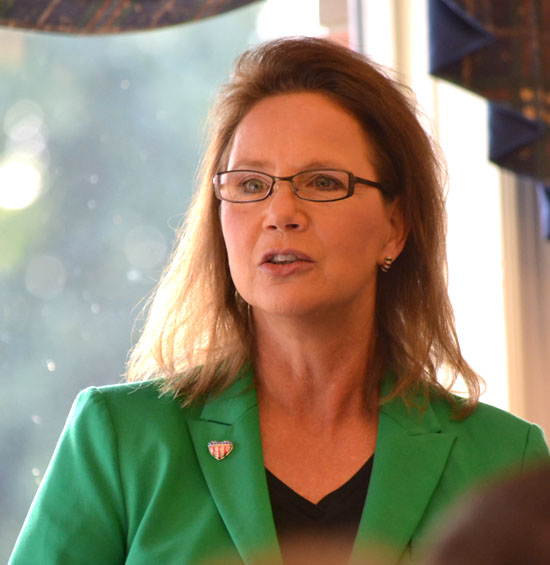Ohio Supreme Court justice speaks in VW
DAVE MOSIER/independent editor
Ohio Supreme Court Justice Sharon Kennedy was in Van Wert Friday morning to address a group of local business and community leaders at the invitation of Central Insurance President/CEO F.W. Purmort.

Justice Kennedy, who was first elected in 2012 over incumbent Yvette McGee Brown, an appointee of then-Governor Ted Strickland to fill Justice Maureen O’Connor’s unexpired position after she was elected chief justice, is now seeking a full six-year term. Kennedy, a Cincinnati native and the daughter of working-class parents, received her education, including her law degree, from the University of Cincinnati.
Speaking at a breakfast meeting at Willow Bend Country Club, Justice Kennedy said her parents, who were raised during The Great Depression, gave her a conservative set of core values, while her experience as a Hamilton police officer, assistant to former Ohio Attorney General Betty Montgomery and as a Butler County domestic relations judge, have provided her with an idea of what the role of a Supreme Court justice should be.
Noting that the American system of government is “fragile”, Justice Kennedy said she believes strongly in the necessary checks and balances between the three branches of government: executive, legislative and judicial. She also stressed the role the judicial system often plays in disputes between the executive and legislative branches.
“One of the unknown, unspoken truths of our system of government, in this republic, is that there is one branch of government that is put upon to keep the two others in check…” she said.
In fact, just two words characterize the justice’s overall court philosophy: “Judicial restraint.”
Unlike Ohio Supreme Court justices who “tweaked” laws back in the 1990s, sometimes even changing the essential meaning of the statutes, Justice Kennedy said her role, as she sees it, is to “uphold the law.” That means interpreting what a law says – and whether it is constitutional – but doesn’t mean rewriting a law to right a perceived wrong, social or otherwise, in her opinion.
Although the justice said some of her decisions have benefited Ohio businesses, she added that she is not “pro-business” (or anti-business, for that matter). In fact, it is not the job of an appellate judge to take sides in legal disputes, but solely to interpret and uphold the law as it’s written, as long as it’s constitutional. If a new law needs to be created – or an existing law changed – that’s the responsibility of the legislative branch of government.
Justice Kennedy did warn, though, that the Ohio Supreme Court could undergo significant philosophical changes over the next four years as a majority of the seven justices are forced to retire because of term limitations.
Justice Kennedy explained that two justices, Judith Ann Lanzinger and Paul Pfeifer, are ineligible for re-election in 2016 because they will be over age 70, while two more, Terrence O’Donnell and William O’Neill, will have to leave the court in 2018 because of age limitations.
Noting that the state still hasn’t fully recovered from some of the decisions made in the 1990s, Justice Kennedy inferred that, if judicial activists replace the four retiring justices, Ohio could suffer harm that could take decades – or longer – to undo.
“What is really at stake in ’16 and ’18 is Ohio,” she told the breakfast group on Friday.
POSTED: 07/19/14 at 7:21 am. FILED UNDER: News







